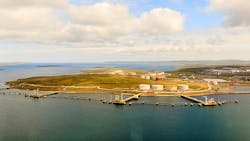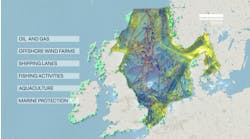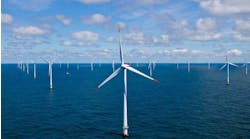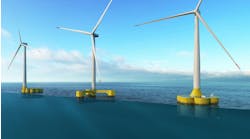EnQuest eyes carbon storage, green hydrogen production at Shetland faciliies
Offshore staff
LONDON — EnQuest is advancing studies to adapt its Sullom Voe Terminal in Shetland for carbon capture and storage (CCS).
The site offers a deepwater port, jetties and a pipeline network linked to various well-understood offshore reservoirs, the company said in its latest results statement.
Some of this could be repurposed to import and permanently store CO2 produced by emitters in the UK, continental Europe or further afield.
Initial feasibility and economic screening studies show that the facilities, including the EnQuest-operated East of Shetland pipeline system, along with storage sites could support a project of up to 10 MM metric tons per year of CO2.
In May EnQuest nominated two CCS license areas in locations accessible from its infrastructure, both of which were accepted, and it plans to submit two applications under the North Sea Transition Authority’s UK offshore CCS licensing round. Results should be announced in first-quarter 2023.
The company has further plans to use its infrastructure and knowledge gained from subsea projects expertise for electrification of nearby offshore oil and gas production centers and other potential developments via a grid connection supplemented with renewable power.
This could reduce emissions from various platforms expected to operate into the 2050s. In addition, EnQuest is assessing a new power solution for the Sullom Voe Terminal to reduce the company’s carbon footprint and repurpose certain areas of the site to harness the wind resource around Shetland for production of green hydrogen and derivatives at export scale.
These could provide a low-carbon alternative fuel to help decarbonize various industries.
As for the company’s ongoing decommissioning programs in the northern UK North Sea, six wells at the Heather Field have been plugged and abandoned to date, along with nine at Thistle.
The tender processes for heavy-lift vessels for removing the two fields’ topsides and jackets have finished, with contracts for the work scopes set to be awarded later this year. The scheduled windows are between 2024 and 2026.
EnQuest has noted the growing competition for heavy-lift vessels to install large-scale wind farms offshore Europe, hence its decision to manage execution of its own heavy-lift scopes within multi-year windows to retain flexibility and allay concerns over availability.
At the Dons Field in the northern North Sea, subsea infrastructure removal within the 500 m is progressing, with the third and final phase due to be completed this month.
Finally, the EnQuest Producer FPSO remains in warm stack at Nigg Energy Park in northeast Scotland. The vessel could be reused on a future project or offered for sale.
09.06.2022



